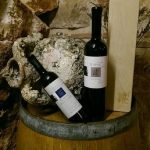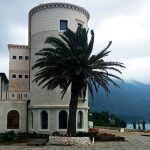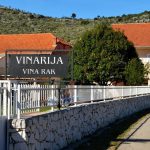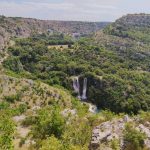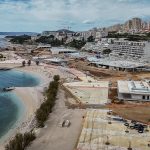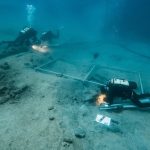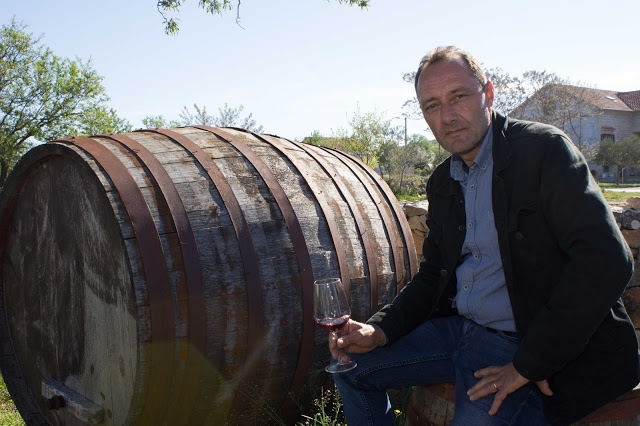
Confirmation that he was on the right path came already at his first appearance at a competition
“Nadin is located on a strategic point which was through its colourful history always interesting to all armies, as those who control the Nadin fort dominate the view all the way to Pag Island, the entire Zadar archipelago, Kornati Islands and the entire Ravni Kotari. This is why we had a war every 50 years and then all we inherited is land and the last name! Everything generations before had created would be annulled by war, and we would start all over again. It was no different after the Homeland War, we started again from zero. When you are aware of such a history and know how tough and bloody work in the vineyard is, I found it most logical to name my wine – Nadinska Rana (Nadin wound)!”
This is how Željko Vrsaljko from Nadin, along with Šime Škaulj, the pioneer of the post-war winemaking in the Zadar hinterland, describes his outstanding coupage of Syrah and Merlot which even today, a dozen years after the first bottling, still provokes various interpretations.
“Nadinska Rana is my best wine and my complete production will be subjected to that wine. Quality must be superior or there won’t be any! Some say the name of the wine is difficult, while others claim it sounds strong and powerful. In any case, this is how it has to be; the name and the wine can always be, and should be, interpreted in various ways. There are also those who pronounce the name of the wine differently, stretching the ‘a’ in ‘rana’, so that rana sounds like hrana (food)! As this is how hrana is pronounced here. This is interesting too, as wine is treated as food,” says Željko, adding that caterers often call him in evening hours asking to address the guests and explain what Nadinska Rana means.
“For marketing it is important for such stories of wine to be created. Just the other day I got a late evening call from a restaurant owner, stating that guests have been discussing the name of my wine the entire evening, if I could come explain what it’s about. If a wine manages to be discussed an entire evening, is there more than that?”
According to some statistics, the small Nadin is among the first in the world by the number of vines per capita. Some analysts searched for historical curiosities about the place and discovered that in 1955 there was “two metres of snow” there, but also that “every summer in Nadin there is more wine than water.” This is today’s statistics which was almost non-existent 20 years ago, at least in terms of grapes. War had caused a neglect of vineyards which were once the pride of Nadin.
Željko Vrsaljko, pre-war admirer of Dire Straits and AC&DC, and the local DJ in Benkovac and Zadar, the first educated chef from Nadin (there are 10 today!), who “even” worked for a year in the kitchen of a restaurant on the Zadar bypass, whose name he doesn’t even recall today, and an expat in Germany, today likes to say that if he had been asked as a teenager what he would do in life to make a living for himself and his family, “I probably would have mentioned any of the listed pre-war hobbies than what I am in today – winemaking and firefighting!”
“This is a consequence of life circumstances, but now I wouldn’t trade those two jobs for anything!”
During the war Željko was in the special police unit and then a reserve policeman, until right after the war, when a fire house opened in Benkovac.
“I said then I could give it a go for a year or two, but very soon I enlisted and completed a school for firefighters. When the state created the central firefighting intervention unit, which I signed up for and completed a bunch of courses and additional education, only then did I realise how challenging firefighting is. I am now an intervention firefighter. I don’t answer to every intervention, only the most complex ones. I was impressed when we intervened down on Pelješac, extinguishing vineyards. I was assigned to put out a fire bearing down on the winery of Miljenko Mike Grgić. We later guarded the Dingač position, to stop the fire from spreading to those vineyards. Why did it have to be me extinguishing vineyards? I was putting out the fire, and tears kept rolling down my face…”
Željko entered a wine story almost by accident. In the mid-1990s, the state had decided to rescue from complete destruction the vineyards then owned by the ruined Agricultural Combine Zadar and give them to Nadin residents through concessions. It was a suggestion of then Parliament representative Drago Krpina, which is why Nadin locals will eventually erect a monument to him. Željko was one of 120 concessionaires.
“In the beginning we were given the land for three years, but when renovation started, and the state obviously had other problems than Nadin vineyards, our concession lasted eight years. Vineyards were old and weary, and Nadin residents were looking for a final solution. It was then that they decided to extend concessions to 25 years, a more serious period for planning a vineyard. When we began working the land, we found a problem in the buyout of grapes. That problem created the idea of the need to create a final product and independent marketing of our own wines. As for the Zadar County, I am a pioneer in the creation of the local wine scene, with a few of my colleagues who began winemaking in 2008. That was when the first bottles of Zadar County winemakers were released to the market. It was only Šime Škaulj and me then, shortly joined by Bobanović, Anić, Bačić, not to name them all.”
Confirmation that he was on the right path came already at his first appearance at a competition, the Sabatina, traditional fair of Dalmatian winemakers, where he won gold for his Nadinska Rana. For Željko, winning that award was like conquering the highest mountain peak. There was no tradition of small wineries in Nadin, wine was produced for domestic purposes, but serious winemaking took place in cooperatives.
“In the family we always had at least 5-6.000 vines. Plavina prevailed with red varieties, and Maraština was most valued with white ones. When I decided to plant my own, I recalled the introduction of French varieties in Nadin, mostly Syrah, once used to give excellent results. I said I have to plant a top variety to even be able to expect anything – and if I miss in the selection, everything else is a waste! I added Cabernet Sauvignon and Merlot to Syrah, while Plavina, realistically a mediocre variety, I cleared out.”
Everything that came after was the stuff of legends. Željko was the first from Zadar County to win a gold medal at an international competition, with his Nadinska Rana from 2009. But even that was not enough for a Zadar restaurant in which he walked into offering wine for sale.
“I know the restaurant owner, he knows me, and right off he told me he does not believe anyone from Zadar can make a good wine. This is a consequence of the bad reputation of this land, which says we are excellent wine growers and poor winemakers. But that ratio is improving, as quality soon came into the light. Now there isn’t a restaurant in Zadar that doesn’t have our wines.”
When Željko made a home in the winemaking waters, he found again time for the many activities he had to skip for a while. Although he doesn’t dance nor ever did, he is the President of the Nadin cultural and artistic society Saint Ante, also the chairman of the local municipal committee. He does not intend to join politics…


